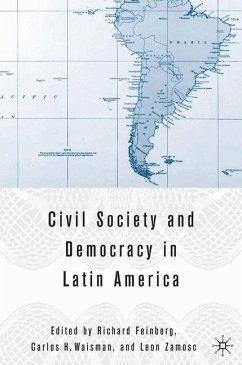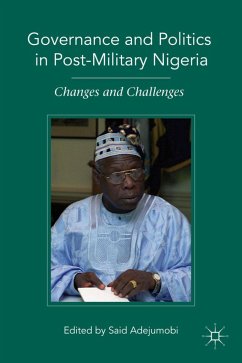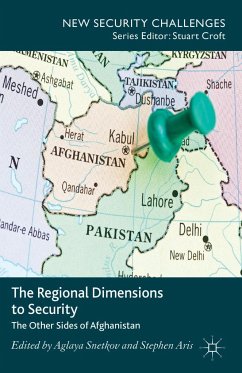
William Avilés
Gebundenes Buch
Globalization and Military Power in the Andes
Versandkostenfrei!
Versandfertig in 6-10 Tagen

PAYBACK Punkte
19 °P sammeln!





Through a series of comparative case studies, the author demonstrates that the conflicts and struggles over capitalist globalization in the Andes are intricately connected to the political power of the military in the region.
William Avilés Associate Professor of Political Science at the University of Nebraska, USA.
Produktdetails
- Verlag: Palgrave Macmillan / Palgrave Macmillan US / Springer Palgrave Macmillan
- Artikelnr. des Verlages: 978-0-230-10387-0
- 2010 edition
- Seitenzahl: 196
- Erscheinungstermin: 19. Januar 2011
- Englisch
- Abmessung: 211mm x 145mm x 20mm
- Gewicht: 346g
- ISBN-13: 9780230103870
- ISBN-10: 0230103871
- Artikelnr.: 29935027
Herstellerkennzeichnung
Libri GmbH
Europaallee 1
36244 Bad Hersfeld
gpsr@libri.de
"Avilés challenges institutionalist explanations of changes in civil-military relations in the Andean region, asserting that U.S. support for neoliberal policy coalitions and the war on drugs has led to reduction of military influence and prerogatives in Colombia, Peru, and, to lesser extent, Bolivia (until 2005) - despite significant internal security threats and insurgencies. In contrast, in Ecuador and Venezuela, repudiation of the neoliberal agenda by social movements and nationalist governments has allowed incorporation of the armed forces into national development agendas that have expanded military influence and prerogatives in the last two decades. Thus governments rejecting "the end of history" with liberal capitalist globalization
Mehr anzeigen
offer new (and continued) opportunities for the military to participate in social and economic development in ways far beyond the limited role prescribed by traditional liberal democratic theory. Both Avilés' theoretical contributions and the empirical case studies will be valuable grist for the mill among researchers on civil-military relations in Latin America." - Brian Loveman, Author of No Higher Law: American Foreign Policy and the Western Hemisphere since 1776 (2010)
"In this absorbing, five nation Andean study, William Avilés reveals the unexpected: that governments in the midst of counter-insurgency wars will subordinate their militaries to civilian control while left wing populist governments will expand the powersand reach of their militaries. The difference is attributed to neoliberal policy coalitions that favor limited democracies, compliant armies and suppressed social movements, and whether they have influence inside a country or not. To my knowledge, this is the first book to analyze Latin American civil-military relations from the vantage point of global capitalist actors and their political allies. This is an important, timely and provocative study. Scholars may disagree with Avilés' thesis, but they cannot ignore it." - David Pion-Berlin, Professor of Political Science and Latin American Politics at the University of California, Riverside
"This book succeeds in linking globalization and socioeconomic interest groups to an explanation of diverse patterns of civil-military relations in Latin America. Professor Aviles identifies neoliberal policy coalitions as an important ingredient in explaining greater civilian control over the armed forces. In countries where such neoliberal policy coalitions are not as firmly entrenched, then the level of civilian control over the armed forces is reduced. The provocative conclusions suggest that neoliberal coalitions may have succeeded, in certain countries, in enhancing civilian control over the military, but only at the expense of imposing a kind of elite-managed democracy (low-intensity democracy) whose economic benefits flow primarily to groups at the top of the socioeconomic ladder." - Dr. Ronald W. Cox, Associate Professorand Director of Graduate Studies, Department of Politics and International Relations, Florida International University
"In this absorbing, five nation Andean study, William Avilés reveals the unexpected: that governments in the midst of counter-insurgency wars will subordinate their militaries to civilian control while left wing populist governments will expand the powersand reach of their militaries. The difference is attributed to neoliberal policy coalitions that favor limited democracies, compliant armies and suppressed social movements, and whether they have influence inside a country or not. To my knowledge, this is the first book to analyze Latin American civil-military relations from the vantage point of global capitalist actors and their political allies. This is an important, timely and provocative study. Scholars may disagree with Avilés' thesis, but they cannot ignore it." - David Pion-Berlin, Professor of Political Science and Latin American Politics at the University of California, Riverside
"This book succeeds in linking globalization and socioeconomic interest groups to an explanation of diverse patterns of civil-military relations in Latin America. Professor Aviles identifies neoliberal policy coalitions as an important ingredient in explaining greater civilian control over the armed forces. In countries where such neoliberal policy coalitions are not as firmly entrenched, then the level of civilian control over the armed forces is reduced. The provocative conclusions suggest that neoliberal coalitions may have succeeded, in certain countries, in enhancing civilian control over the military, but only at the expense of imposing a kind of elite-managed democracy (low-intensity democracy) whose economic benefits flow primarily to groups at the top of the socioeconomic ladder." - Dr. Ronald W. Cox, Associate Professorand Director of Graduate Studies, Department of Politics and International Relations, Florida International University
Schließen
Für dieses Produkt wurde noch keine Bewertung abgegeben. Wir würden uns sehr freuen, wenn du die erste Bewertung schreibst!
Eine Bewertung schreiben
Eine Bewertung schreiben
Andere Kunden interessierten sich für













